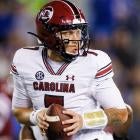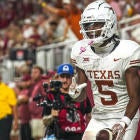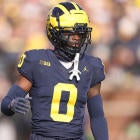Seahawks inside linebacker Bobby Wagner alluded to representing himself on his next deal when asked about his contract situation during training camp last year. He confirmed he would be negotiating his own contract a few days after the Cowboys eliminated the Seahawks in the wild-card round of the playoffs last season.
Wagner addressed his contract during a press conference on Tuesday as Seattle's offseason workout program moves into organized team activities (OTAs). He is attending OTAs but isn't a participant because he hasn't gotten a new contract. It's hard to blame Wagner for being a spectator for precautionary measures after Redskins inside linebacker Reuben Foster tore his left ACL Monday on the third snap of Washington's OTAs. The Seahawks don't have a problem with Wagner essentially serving as an extra coach, where he provides his wisdom to the team's younger defensive players.
Wagner, who is entering the final year of a four-year, $43 million contract extension, should be Seattle's top signing priority. Quarterback Russell Wilson became the NFL's highest-paid player last month before his self-imposed deadline to cease contract discussions until after the season if an agreement on a new deal wasn't reached. Seahawks 2019 first round pick L.J. Collier has signed his four-year rookie contract as well.
Players representing themselves in contract negotiations is a rarity. Any deal Wagner does for himself will be one of the most scrutinized NFL player contracts in recent memory, at least by industry professionals such as agents and team negotiators.
Recent history of self-representation
Other players have negotiated their own contracts with varying degrees of success. Cardinals wide receiver Larry Fitzgerald has represented himself ever since his highly regarded agent Eugene Parker passed away in 2016. The three one-year deals Fitzgerald has negotiated probably would have made Parker proud.
The one-year extension Fitzgerald signed during the middle of the 2017 season had rather unique incentive clauses. Most incentives pertain to a particular season. Fitzgerald's incentives, which were realistically achievable, stretched over two seasons. He earned $1 million worth of incentives in that contract.
Linebacker Jon Beason, who retired after the 2015 season, did his own deal in 2014 as an unrestricted free agent. The deal was consistent with contracts signed by comparable inside linebackers.
Offensive tackle Russell Okung navigated free agency in 2016 and 2017 without an agent. His second foray went much better than his first one. Okung signed a four-year, $53 million deal in 2017 with the Chargers, which at the time made him the league's highest-paid offensive lineman.
Cornerback Richard Sherman signed an overly team-friendly three-year deal with the 49ers in 2018 after being released by the Seahawks. He wasn't adequately protected structurally in the contract. Sherman has a substantial amount of money in difficult-to-achieve incentives. The consensus industry opinion is the 49ers got the much better end of the bargain.
How Wagner can succeed
Wagner should learn from Sherman's self-representation. Sherman touted his study of contracts for less than two full workdays for the average person prior to representing himself as one of his main qualifications for going without an agent. Representing athletes and negotiating playing contracts is a profession where someone can't become an expert with a proper understanding of the nuances of the deals practically overnight.
Quite frankly, negotiating player contracts in any sport isn't going to be confused with brain surgery. There are many players intellectually capable of negotiating a contract for themselves comparable to what a competent agent would have done under the right circumstances.
I would occasionally have select clients talk to a team negotiator when at an impasse because I felt hearing from the player could help reinvigorate contract discussions. This would only occur with a client who was fully engaged in the negotiation process and after I was convinced he was comfortable with the talking points developed for the meeting.
Several former players have become successful agents. Most notably, Tom Condon started representing players in the mid-1980s while his own NFL career was coming to an end. He is best known for his work with franchise quarterbacks, which include Drew Brees, Eli Manning, Peyton Manning, Matt Ryan and Matthew Stafford. Condon made Ryan the NFL's first $30 million per year player in the spring of 2018.
As long as Wagner has been extensively studying the market with similar seriousness as he would the game plan for an opponent, it won't be easy for Seattle to take advantage of him. Okung had the foresight to have an experienced industry professional serve as an advisor. Wagner adopting more of an Okung approach than a Sherman approach will help put him in a better position to succeed.
Seahawks' concerns
The Seahawks have some trepidation about negotiating directly with Wagner partially because of their experiences with Okung and Sherman when the latter was still with the team and the need to have direct or blunt conversations without an agent being a filter. Wagner downplayed the notion that he wouldn't be able to handle criticism during the negotiations in his press conference. He stated he understands the nature of the business part of football and stressed his professionalism.
Okung's negotiation was going to be challenging whether or not an agent was involved. He hadn't consistently played at a high level since his 2012 Pro Bowl season partially due to injury. As a draft pick prior to the implementation of the rookie wage scale, Okung probably wasn't going to be interested in staying with the Seahawks on a new contract that was less the six-year, $48.5 million deal (with $29.3 million guaranteed and worth a maximum of $58 million) he signed in 2010 as an unproven commodity when he was the sixth overall pick.
Sherman was recovering from rupturing his right Achilles tendon during the middle of the 2017 season. The injury complicated Seattle's dealings with Sherman.
Wagner is in a much different place than those guys. He is at the top of his game. Wagner has been named first- or second-team All-Pro for five consecutive seasons. There aren't any durability concerns either. Wagner has played at least 90 percent of Seattle's defensive snaps every season since signing his extension in 2015.
How the situation can get acrimonious
Reports surfaced earlier in the month that Wagner had no interest in giving Seattle a hometown discount. C.J. Mosley dramatically reset what had been a stagnant inside linebacker market in free agency by signing a five-year, $85 million contract with the Jets this offseason. The deal has $51 million in guarantees, of which $43 million was fully guaranteed at signing. Wagner said Tuesday, "The market is the market. That's the top of the linebacker market. So that's the standard, so that is plan, to break that." He has the same outlook on his contract that any competent agent would have.
Teams make a habit of signing players as cheaply as possible with the most advantageous structure. Seattle runs the risk of creating acrimony with Wagner in trying to dismiss or treat Mosley's deal as a market anomaly.
It will be hard for Seattle to reconcile that Wagner is worth less than Mosley after volunteering late last season he is on a Hall of Fame trajectory. Wagner was surely made aware of the sentiment.
"It just seems like [Wagner's] a little bit better," head coach Pete Carroll said last December, "He's made more big plays, more significant plays that have affected the game than ever ... And Bobby's put together a resume of really Hall of Fame stuff. This is the kind of guy that gets there someday." Carroll further added, "The leadership that he's brought and the direction and the focus that's he's brought on a regular basis, I mean he's been a perfect Seahawk throughout the time he's been here. We're just very lucky to have him."
Wagner indicated that he has been in communication with the Seahawks about his contract but didn't reveal whether offers had been exchanged. The Seahawks have a perfect window of opportunity to make substantial progress with, if not sign Wagner to a new contract during the next three weeks before the players disperse when the mandatory minicamp ends on June 13 until training camp starts in late July.
It would behoove Seattle to quickly concede that Wagner should be the highest paid at his position, which is something his current deal briefly made him in 2015 until Panthers inside linebacker Luke Kuechly's contract topped it a few weeks later. The negotiations really should focus on how much more Wagner should get than Mosley rather than if he should be paid more than Mosley.
Wagner is a considerably better player. Mosley is a four-time Pro Bowler but would have only made the game as an alternate during the last five seasons if playing in the NFC because of Wagner and Kuechly.
Wagner can legitimately be included in the discussion around who's the NFL's best defensive player. There are only two players who have been named first-team All-Pro by the Associated Press in each of the last three seasons. Rams interior defensive lineman Aaron Donald, who has won the last two NFL Defensive Player of the Year awards, is one of the two. Wagner is the other.
Wagner's leverage
Wagner possesses a good amount of leverage in the situation. The Seahawks didn't trade defensive end Frank Clark to the Chiefs, who subsequently signed a five-year, $104 million contract with $62.305 million in guarantees ($43.805 million fully guaranteed at signing), for Wagner's contract to expire.
Wagner appears to be comfortable playing out his contract if he isn't offered the right deal. That would put Seattle in the position of having to decide whether to designate Wagner as a franchise player or risk losing him on the open market next year. Wagner's 2020 franchise tag projects to $16.845 million under the Collective Bargaining Agreement's provisions for such designations because 120 percent of his prior year's salary is applicable. Prior year's salary is typically a player's salary cap number for these purposes.
Wagner would be hitting in the open market at age 29 if he plays out his current contract. Players of Wagner's caliber aren't available in free agency very often. It's conceivable that Wagner could join his former teammate Clark in the club for non-QBs making $20 million per year with a season comparable to his recent ones in 2019 if on the open market.
Final thoughts
A certain segment of the agent community is going to be highly critical of whatever contract Wagner negotiates for himself, where things he could have done better or differently will be highlighted even if his deal objectively is an appropriate one. This will stem from a fear that the deal will be the catalyst for self-representation becoming much more commonplace. That scenario seems unlikely, because not all players are equipped to handle their own contract negotiations. I suspect most that could aren't going to be inclined to so do.
A good or strong Wagner deal will give those who want represent themselves the impetus to follow in his footsteps. It will be critical for anyone seriously considering self-representation to be able to honestly assess their standing in the game before making the decision. Otherwise, it could be a disappointing experience.





















